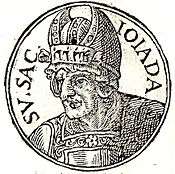Jehoiada
Jehoiada (Hebrew: יְהוֹיָדָע Yəhōyāḏā‘, "Yahweh knows") in the Hebrew Bible, was a prominent priest in the kingdom of Judah during the reigns of Ahaziah (reigned c. 842 - 841 BCE), Athaliah (reigned c. 841–835 BCE), and Joash (reigned c. 836–796 BC). Jehoiada became the brother-in-law of King Ahaziah as a result of his marriage with princess Jehosheba.[1] Both Jehosheba and Ahaziah were children of King Jehoram of Judah (reigned c. 849 – 842 BCE). Ahaziah died a year after assuming the throne, which was then usurped by his mother Athaliah, who ordered the execution of all members of the royal family.

| Part of a series of articles on |
| Priesthood in Judaism |
|---|
| |
|
Kohen · Recognition of priestly descent Priestly covenant |
|
High Priests Aaron · Eleazar · Phinehas · Eli · Ahimelech · Abiathar (First Temple) · Zadok · Shallum · Hilkiah · Jehoiada (Second Temple) Joshua the High Priest Simeon the Just Yishmael Ben Elisha Yehoshua ben Gamla Pinchus Ben Shmuel |
|
Twenty-four kohanic gifts The ten gifts given in the Temple 1. Sin offering · 2. Guilt offering 3. Communal peace offering 4. Fowl sin offering · 5. Leftovers from the suspensive guilt offering 6. Oil from the offering for the leper 7. Bread from First Fruits · 8. Showbread 9. Leftovers of the meal offering 10. Leftovers of the First Sheaf.
15. Heave offering 16. Heave offering of the Levite's tithe 17. Dough offering 18. First shearing of the sheep 19. Shoulder, cheeks and maw 20. Coins for redemption of the first born son · 21. Redemption of a donkey · 22. Dedication of property to a priest · 23. Field not redeemed in a Jubilee year · 24. The property of the foreigner with no heir. |
|
Priestly Garments |
|
Miscellaneous topics The Mitzvah of sanctifying the Kohen Kohanic disqualifications Holy anointing oil Kahen Aaron's rod Bat-Kohen (daughter of a kohen) Sons of Zadok Contact by a kohen with a dead body 13 Kohanic cities |
Jehosheba and Jehoiada rescued Athaliah's one-year-old grandson, Joash, from Athaliah's slaughter. For six years, they hid the sole surviving heir to the throne within Solomon's Temple. Jehoiada was instrumental in the staging of a coup d'état which dethroned and killed Athaliah. The account in 2 Chronicles notes the resolve of Jehoiada (Jehoiada strengthened himself in the King James Version, Jehoiada took courage in the English Standard Version, words which do not occur in the parallel passage of 2 Kings 11:4).[2] Athaliah described the coup as an act of treason (2 Chronicles 23:13).
Under Jehoiada's guidance, Baal-worship was renounced and the altar and temple of Baal were destroyed.[1] Jehoiada is also noteworthy for the national covenant that he made "between him, and between all the people, and between the king, that they should be the LORD's people" (2 Chronicles 23:16). Jehoiada lived for 130 years and was buried very honorably among the kings in the city of David (2 Chronicles 24:15).[1] Jehoiada's son, Zechariah ben Jehoiada, was later martyred by King Joash.
Priest or High priest?
Jehoiada's name does not appear in the list of the Zadokite dynasty in 1 Chronicles 5:30-40 (6:4-15 in other translations).
Josephus mentions Jehoiada as "high priest in his Jewish Antiquites Book 9, Chapter 7,"[3] "How Athaliah reigned over Jerusalem for five [six] years, when Jehoiada the high priest slew her." However, Josephus does not mention a Jehoiada in his list of High Priests (Antiquities of the Jews 10:151-153).
According to the medieval chronicle Seder Olam Zutta (804 CE), Jehoiada was a High priest.
The Book of Chronicles states in 2 Chronicles 24:6 [4] that Jehoiada was the chief priest, another term for high priest.
References
- "Jehoiada", Jewish Encyclopedia
- Barnes, W. E. (1899) ,Cambridge Bible for Schools and Colleges on 2 Chronicles 23
- The Complete Works of Flavius Josephus - Page 237 William Whiston
- 2 Chronicles 24:6
See also
Bench, Clayton H. The Coup of Jehoiada and the Fall of Athaliah: The Discourses and Textual Production of 2 Kings 11. Piscataway: Gorgias Press, 2016.
| Israelite religious titles | ||
|---|---|---|
| Preceded by Jehoshaphat (According to the Seder 'Olam Zutta) |
High Priest of Israel | Succeeded by Pediah (According to the Seder 'Olam Zutta) |
![]()